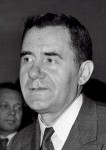 Andrei Gromyko (1909-1989) was a Soviet politician and foreign minister for much of the Cold War. Gromyko was born near Gomel, in what is now Belarus. His father was an uneducated factory worker and their family was impoverished. Gromyko joined the Communist Party in his early teens while completing his secondary education. By the early 1930s, Gromyko was a Communist Party organiser and a school principal in Dzerzhinsk. The party offered him a scholarship to study economics in Minsk, which he accepted. Gromyko worked for a time in the Russian Academy of Sciences before joining the diplomatic service. In late 1939 Soviet dictator Joseph Stalin appointed him deputy ambassador to the United States. The appointment was peculiar, given that Gromyko had no specialist knowledge of the US and spoke almost no English. Despite these limitations, he proved a skilled diplomat and in 1943 was promoted to US ambassador.
Andrei Gromyko (1909-1989) was a Soviet politician and foreign minister for much of the Cold War. Gromyko was born near Gomel, in what is now Belarus. His father was an uneducated factory worker and their family was impoverished. Gromyko joined the Communist Party in his early teens while completing his secondary education. By the early 1930s, Gromyko was a Communist Party organiser and a school principal in Dzerzhinsk. The party offered him a scholarship to study economics in Minsk, which he accepted. Gromyko worked for a time in the Russian Academy of Sciences before joining the diplomatic service. In late 1939 Soviet dictator Joseph Stalin appointed him deputy ambassador to the United States. The appointment was peculiar, given that Gromyko had no specialist knowledge of the US and spoke almost no English. Despite these limitations, he proved a skilled diplomat and in 1943 was promoted to US ambassador.
After World War II Gromyko served as the Soviet delegate to the United Nations, ambassador to Great Britain and deputy foreign minister. He was given full membership of the Central Committee in 1956 and appointed Commissar for Foreign Affairs (foreign minister) the following year. He would retain this position for an astonishing 28 years. During this time Gromyko played a significant role in shaping and enunciating Soviet foreign policy. He was also the lynchpin in US-Soviet communications, working with American presidents from Roosevelt to Reagan and playing a critical role in events like the Cuban missile crisis. Gromyko was renowned for his intelligence, memory and understanding of world affairs, though many non-Russians found him dull, uncommunicative and hard to convince (some Western diplomats dubbed him “Mister Nyet”). In 1973 Gromyko was elevated to the Politburo, where he was given responsibility for deciding foreign policy as well as implementing it.
Gromyko’s demise followed the elevation of Mikhail Gorbachev to the Soviet leadership. Gorbachev considered Gromyko yesterday’s man, too inflexible and unimaginative to change. He was removed as foreign minister and given the largely ceremonial office of Chairman of the Supreme Soviet. Despite this, Gromyko gave quiet support to Gorbachev’s glasnost and perestroika reforms. He retired from Soviet politics in early 1989 and died just a few weeks later, aged 79.
Content on this page is © Alpha History 2018-23. This content may not be republished or distributed without permission. For more information please refer to our Terms of Use.
This page was written by Jennifer Llewellyn and Steve Thompson. To reference this page, use the following citation:
J. Llewellyn & S. Thompson, “Andrei Gromyko”, Alpha History, accessed [today’s date], https://alphahistory.com/coldwar/andrei-gromyko/.
